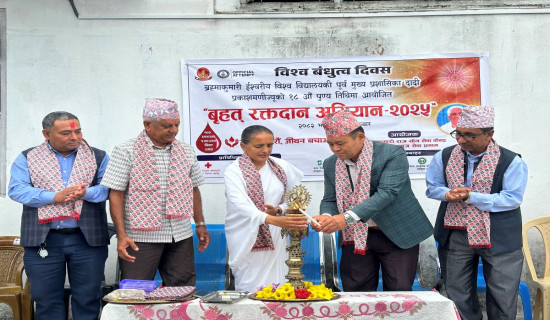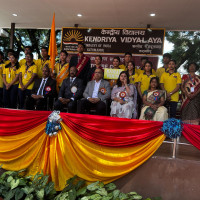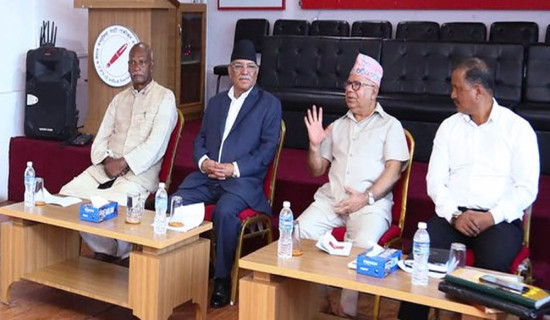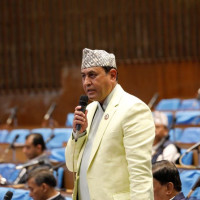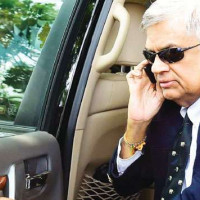- Saturday, 23 August 2025
Great Power Cooperation Vital For World Peace
The world now faces a security dilemma where each powerful state is fighting for strategic heft relative to others, constructing blocs and signing security and trade treaties for competitive advantages. The international state of nature reflects security, diplomatic, economic and technological competition for strategic resources rather than cooperation for an order of mutual benefits. The triumph of geopolitics affirms the naked reason of state. It has subordinated the values of sociability, law and morality. Great powers’ cooperation is vital for the design of a lawful international order. Wealthy nations help the poor to catch up. It can avert wars and enable small nations to exercise their natural rights for freedom, justice and peace.
Small nations use their location, leverage and resources, embrace cosmopolitan rights and act as bridges between conflicting sides. Their peaceful diplomacy can bring rival sides to the negotiation table. Qatar provided a venue for mediation between Congo and Rwanda-aided M23 rebellion and the release of Israeli and Hamas prisoners of war. The US boasts its role in the de-escalation of conflict between India and Pakistan, Israel and Iran, Congo and Rwanda and Syria and Israel. It called for a ceasefire between Thailand and Cambodia. It is hard to say whether an edifice of peace is erected on the UN Charter for the peaceful resolution of conflicts.
Divided political will
The searing issues are: divided political will among great powers, lack of wise statesmanship, defiance of international laws and institutions and shifting geopolitical interests. They snub the exigency to manage even climate change and humanitarian affairs. In a contesting situation, a certain level of trust among them is vital to nurture civilised conduct of nations, as war drains both sides. The following points can be deemed critical:
Global contract: Many international institutions such as the UN, WTO and Inter-parliamentary Union and international regimes set up to promote security, cooperation and development are facing rationality deficits owing to the breach of the spirit of the global contract and deviation of powerful nations from their commitments. The UN sought to create a world order based on mutual security, peace and prosperity and respect for human rights. Many of its resolutions on global health, women and security, climate change and sustainable development have transformational effects.
The great power politics has made the UN Security Council a prisoner of indecision in controlling the proliferation of nuclear weapons, inter-state wars and organising informed dialogue for peace and enforcing decisions. The veto power represents status and hierarchy, not equal dignity among the nations. As a result, unrepresented continents and nations that possess capabilities demand their permanent membership. The utility of the UN Secretariat to play a mediating role between the warring nations has not diminished.
Many nations are supporting UN 80, an initiative of the UN Secretary General to improve this world body’s functional capacity, execution of mandate and possibility of structural reforms to address declining budgets, political turmoil, surging global crises and representation. New regimes such as BRICS and the EU must boost finance for the global public goods and uphold global contracts. International regimes can contribute to bringing nations into the realm of diplomacy.
Cultivating multilateralism: Multilateral institutions are key to creating norms, rules and order to ease peaceful cooperation among nation-states and contain those violating the standards of conduct. The function of peace rests on opting for multilateralism rather than a clash of national self-interests and a clash of bloc solidarity. Earlier, 25 per cent of the UN Fund came from the US. The American retreat from many liberal institutions, including the WTO and UN agencies, has reduced their efficacy, while the imposition of tariffs and cuts in development aid worldwide created a resource and diplomatic vacuum that the Chinese are filling.
China has offered the WHO $ 500 million and the Human Rights Council $400 million. It is one of the biggest contributors to UNESCO, the International Telecommunication Union and emergency aid. It has proposed to set up a global AI cooperation body. The EU and the Global South have to fill the leadership vacuum. The EU and the US reached a trade deal of 15 per cent tariffs but were at odds with China and India over the import of Russian oil. The Chinese support to the liberal order is fused with its alternatives-- global security, civilization and development initiatives with win-win outcomes.
The US-Russia reset had radiated positive vibes but it is turning into a mere respite. Manifest geopolitical polarisation exists between Russia and the West on the Russia-Ukraine and Iran-Israel wars. Iran is backed by Russia, China, North Korea, Turkey and Pakistan, while Israel is backed by the US and some European nations. NATO chief articulated that it must be ready for global conflict with long-range missile support to Ukraine to attack major Russian cities. France, Italy and Hungary have refused to fund the American air defense system for Ukraine.
The publication of the map of Greater Israel depicting part of Syria, Iraq, Egypt, Lebanon, Jordan and half of Saudi Arabia and the mobilisation of public opinion to acquire them portend the craze of escalation. Israel is fighting wars with Iran, Iraq, Libya, Syria, Somalia and Sudan. Peace in the Middle East can be possible through the UN-mandated two-state solution, which the Israeli government opposes. About 145 nations have recognised the Palestinian state. Viable peace in West Asia matters for the flow of oil, trade, investment and connectivity.
Escalation of conflict spikes vicious distrust: Misperception of each other’s capability, intention and strategy cuts the ground for cooperation on shared interests. The US fear of coordination between China and Russia on cyber security, military action and economic planning has prompted its direct military action so that Russia's weakness can make it ready for peace. The US is angry over Russia occupying the mineral-rich land of Ukraine, where it has settled to share 50 per cent.
As Russia ignored Trump’s 50-day deadline for peace, the US sent a nuke to the UK and NATO officially entered into the Russia-Ukraine war, increased defense budget, supplied long-range missiles and showed ardor to integrate Ukraine into NATO, to which Russia mobilised sturdy countermeasures. The Russian army has suggested President Vladimir Putin to deploy nuclear-laced hypersonic missiles for strikes against enemies. It has also suspended energy cooperation with the US hitting the weak parts of its economy. Only a common ground can ease de-escalation.
Peace requires dialogue, not offensive military measures: The UN Security Council has urged its 193 member nations to use diplomatic means to settle conflicts in the Middle East, Ukraine, Sudan, Haiti, Myanmar and the Indo-Pakistan dispute on Kashmir and avert terrorism and transnational crimes vitiating world order. The UN has deployed 60,000 peacekeepers in various parts of the globe. The NATO chief threatened India, China and Brazil for buying Russian oil and gas while the latter are reluctant to join peace talks with Ukraine.
India reacted to this threat, saying that the US and Europe are also buying LNG from Russia. About 19 per cent of Russian gas flows to Europe. The US is facing a tricky situation as it has failed to wean China and India away from Russia. President Trump has threatened Iran, “We will strike Iran’s nuclear sites again, if necessary,” which prompted Iran to continue its nuclear pursuit, mobilize international support and fight for the nation’s sovereignty. Russia, China and the EU have opposed the Israeli attack on Gaza and repeated violation of Syrian sovereignty.
Any vicious attack on Iran can prompt it to close the Strait of Hormuz, from which 20 per cent of the world's oil passes. Its effects would be huge — rise of oil and gas prices, inflation, closure of factories and strains on the supply chain. Iran, China and Russia have deployed their warships in the Arabian Sea and lent defense support to Iran. When all the great powers possess vast, mutually destructive nuclear weapons, any strategy of peace requires not the victory of one power but peaceful coexistence.
New economic regime: About 159 nations have abandoned US dollars and started doing business in their own currencies, thus ditching the SWIFT (Society for Worldwide Interbank Financial Telecommunication) payment system. BRICS has also printed its currency. It appears that President Trump's efforts to retain the primacy of dollars backfired. BRICS is unfazed by the new tariff measures of the US. The emergence of BRICS has changed the landscape of the world political economy and the conditionalisation of aid by Western donors. With its size and influence, it offers strategic autonomy for its members.
Shared interests
With 21 nations, it is flourishing outside the orbit of the G7 and controls 40 per cent of the world's GDP, while G7 nations share only half. Unlike the EU, BRICS does not demand regime compatibility but relies on finance, investment, development and sovereignty, thus supporting the priorities of nations. Its social contract is based on shared interests, not ideology and, therefore, member nations, including small ones, can exercise their freedom of choice. Frustrated by the EU, two European nations-Turkey and Serbia, have shown their interest in joining it.
The revival of- Russia-India-China coalition (RIC), a precursor of BRICS, can rebalance world politics as it has leadership in many areas: largest population, biggest army, 50 per cent of energy, 35 per cent share of world economy and cutting-edge technologies. For this, however, shelving and solving their old festering sores and trust-building between China and India is essential to their progress and allows poor nations to prosper. The setup of the institutions of global governance by pooling sovereignties is vital to abolishing the global state of nature and formulating public policies attuned to public opinion. In it, nations can claim their rights, respect the command of the governing body prescribing international laws and compel those who refuse to obey the social contract.
(Former Reader at the Department of Political Science, TU, Dahal writes on political and social issues.)



